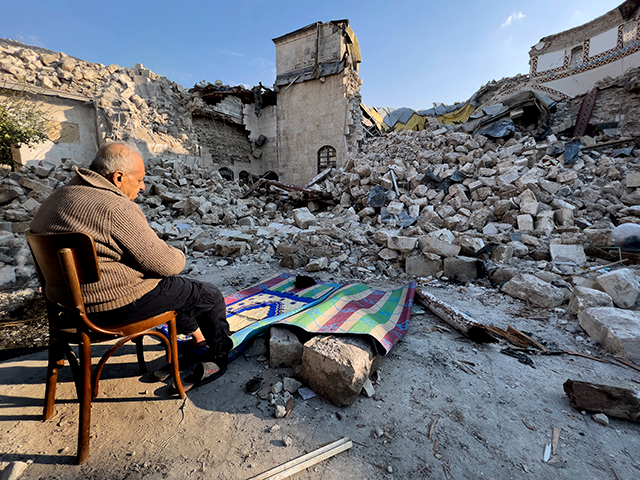At least six more deaths were reported by Turkish officials from Monday’s magnitude 6.4 earthquake in Hatay province, plus two deaths in Syria reported by the White Helmets civil defense organization.
The current death toll from the more powerful earthquakes of February 6 stands at over 47,000 in Turkey and Syria.
Turkey’s Disaster and Emergency Management Presidency (AFAD), the country’s main disaster management agency, said on Tuesday that six people were killed and roughly 300 injured by the Monday quake, which was centered on the town of Defne.
Syrian authorities say they have treated a number of patients for heart attacks brought on by fear following the latest earthquakes. Live updates. https://t.co/LyNgSDnxZL
— John Bacon (@realjohnbacon) February 21, 2023
The major 6.4 quake on Monday was followed by a second and distinct 5.8 quake and several dozen aftershocks. According to AFAD, these subsequent tremors injured and killed some people who entered damaged buildings to retrieve their possessions after the initial 6.4 earthquake.
Turkish Health Minister Fahrettin Koca reported 294 injuries from the Monday quake, 18 of them serious enough to require hospitalization.
AFAD counted a total of 41,156 fatalities from the earthquakes as of Tuesday, plus 105,505 injuries. The quakes affected over 13 million people spread across 13 Turkish provinces. 485,682 have been evacuated from the affected areas.
AFAD said it has over 250,000 search and rescue personnel working in the disaster areas, aided by roughly 3,200 foreign rescue personnel.
At least 41,156 people killed and 105,505 injured by two strong earthquakes that centered in Kahramanmaras and impacted more than 13M people across 11 provinces southern Türkiye on Feb. 6, officials said https://t.co/Pa9Lws3Ply pic.twitter.com/ZH8WGZCNhP
— ANADOLU AGENCY (@anadoluagency) February 20, 2023
Three Turkish hospitals were evacuated as a precaution due to damage from the Monday tremors. Two of the evacuated facilities were the only two hospitals currently operating in the Iskenderun district of Hatay province, but a field hospital has been established for emergency treatment.
Turkish doctors told the Associated Press that stress, trauma, and feelings of hopelessness were serious problems for survivors. The panic from Monday’s fresh quake exacerbated the mental health crisis among earthquake victims:
Dr. Tahsin Cinar, an anesthesiologist using vacation time to help provide medical care in Hatay as a representative of the Turkish Medical Association, said earthquake survivors need serious help with their mental health.
“They feel so alone, so deserted and very anxious. Even a small tremor leads to a big anxious reaction,” he said.
Cinar and other volunteers initially provided emergency care for people with physical injuries. Now, they are seeing more signs of psychological trauma, depression and the stress that comes with a lack of safe housing, winter weather and a pause in education.
Hospitals evacuated right after new tremors rattle Hatayhttps://t.co/zW42sPWDCG pic.twitter.com/ed2OszBFAs
— Hürriyet Daily News (@HDNER) February 21, 2023
Thousands of people a day are reportedly fleeing the earthquake region for safer ground along the coast and in the capital of Istanbul. The Turkish Defense Ministry said about 20,000 Syrian refugees are returning to Syria because the quakes destroyed their homes in Turkey.
Syrian media said on Tuesday that a woman and a girl were killed “as a result of panic” during the Monday quake in the provinces of Hama and Tartus.
The White Helmets, a rescue organization opposed to the Syrian regime, reported 190 injuries in rebel-held areas of northwestern Syria. The group said several buildings collapsed during the latest earthquake, but no victims were trapped under the rubble.
https://www.hurriyetdailynews.com/recent-quake-in-hatay-felt-in-middle-east-north-africa-181065
Hospitals in northwestern Syria reported receiving patients with relatively minor injuries from falling rubble, along with people who panicked during the new quake.
Turkey’s Hurriyet Daily News on Tuesday quoted experts who said the Monday quake was a distinct event with a separate epicenter, not an aftershock of the two devastating February 6 quakes:
“A large fault passing through the sea off Samandağ has been broken. This earthquake occurred at the intersection of the southern end of the fault that created the last major earthquake of 7.7 and the fault zone that we call the Cyprus Arc,” expert Ramazan Demirtaş said.
Reminding about the Zaferburnu seismic gap in the region, the two sequential big quakes on Feb. 6 induced some faults with a seismic gap, Demirtaş noted.
Geoscientist Naci Görür stated that this earthquake was already expected as there was a stress accumulation after the earthquakes on Feb. 6.
The Monday quake was felt across the island of Cyprus, which has long feared the possibility of a major seismic event.
Residents of Turkish Cyprus were angered on Monday when their government announced a new tax of up to five percent for the next year to raise money for mainland earthquake victims. Among other objections, Turkish Cypriots worry that their own towns and cities are not adequately prepared for an earthquake, so emergency funds should be spent for that purpose.
“It is very wrong to take a decision hastily with regards to a decision that concerns everyone, from the retirees to minimum wage earners, and make a deduction from everyone. Humane feelings are trying to be abused, said Turkish Cypriot civil service union president Guven Bengihan.

COMMENTS
Please let us know if you're having issues with commenting.